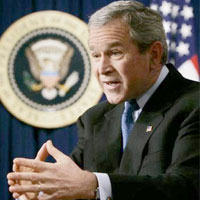George Bush thinks nuclear agreement with India could help lower fuel prices
United States President George W. Bush got a victory Thursday on his first visit to India , securing a landmark nuclear energy agreement that he said could help ease energy prices.

Bush and Indian Prime Minister Manmohan Singh announced the deal, which will open most Indian reactors to international inspections and provide the growing nation with U.S. nuclear technology, during a joint news conference after meeting privately to hammer out details.
The agreement between the world's oldest and largest democracies was a political coup, too, for Singh. "We made history," he said, standing alongside Bush in a sunwashed palace courtyard.
Under the accord, the United States will share its nuclear know-how and fuel with India to help power its fast-growing economy. It represents a major shift in policy for the United States , which imposed temporary sanctions on India in 1998 after it conducted nuclear tests.
"We concluded an historic agreement today on nuclear power," Bush said. "It's not an easy job for the prime minister to achieve this agreement, I understand. It's not easy for the American president to achieve this agreement, but it's a necessary agreement. It's one that will help both our peoples."
Critics say the United States is using India as a counterweight to China 's growing economic and political influence. And they argue that the agreement sends the wrong signal to leaders of North Korea and Iran , who have thumbed their noses at international monitoring of their weapons programs.
Bush disagreed. "What this agreement says is things change, times change that leadership can make a difference," he said.
"I'm trying to think differently, and not stay stuck in the past."
The agreement will require U.S. congressional approval. Bush immediately acknowledged that will be difficult to win.
Bush said he will tell lawmakers that the U.S.-India relationship is changing for the better and that it is in the United States ' interest to cooperate with India on its nuclear programs. He also said the deal could be a boon for U.S. consumers.
"Proliferation is certainly a concern and a part of our discussions, and we've got a good faith gesture by the Indian government that I'll be able to take to the Congress," Bush said. "But the other thing that our Congress has got to understand that it's in our economic interests that India have a civilian nuclear power industry to help take the pressure off of the global demand for energy."
Bush and Singh also announced new bilateral cooperation on an array of issues from investment to trade, health to the environment, agricultureto technology, and even mangoes. "Mr. Prime Minister, the United States is looking forward to eating Indian mangoes," Bush said of a provision that will bring the country's beloved fruit to the U.S. for the first time in nearly two decades.
But the civilian nuclear agreement is the major building block of renewed relations between the United States and India , which is seeking greater recognition on the world stage.
India insists it has been a good steward of nuclear material for decades; that there has never been one incident of proliferation from it.
But Singh's leftist allies criticized the pact, saying it paves the way for U.S. meddling in Indian affairs. "Today is one of the most shameful days in the history of independent India ," said Shambhu Shrivastava, spokesman for the socialist Samata Party.
Bush and Singh signed an agreement in July, but it hinged partly on determining how to segregate India 's nuclear weapons work from its civilian nuclear program. A senior U.S. official and a senior Indian official said in separate briefings that India classified 14 of its 22 reactors as civilian, which would open them to international inspection. Eight were deemed military reactors, exempting them from inspection.
The late night negotiations for the nuclear pact, coupled with protests planned throughout Bush's stay, reflected India 's mixed feelings about the visit by the leader of the United States a country seen as a loyal friend by some and a global bully by others.
Many business and government leaders are eager to strengthen ties with the United States .
But for a second day Thursday, thousands of demonstrators gathered in New Delhi to protest Bush's visit. Dozens of politicians, mainly from leftist parties, stood on the steps of the country's national parliament building chanting "Bush go back!" and "Down with Bush!"
"We're saying this because he is the biggest killer of humanity in the 21st century. He has killed in Afghanistan , he has killed Iraqis and now he is bent on killing Iranians," said Hannan Mollah, a lawmaker from the Communist Party of India (Marxist). "The Indian government should not get into any deal with the Americans."
Bush said he was mourning the loss of life in a bombing Thursday near the U.S. consulate in the southern Pakistan city of Karachi . At least four people died, including a U.S. foreign service officer. The attack occurred hundreds of miles from Islamabad , where Bush was headed later this week.
"Terrorists and killers are not going to prevent me from going to Pakistan ," Bush said.
The day was to end with an elaborate state dinner, reports the AP.
D.M.
Subscribe to Pravda.Ru Telegram channel, Facebook, RSS!





